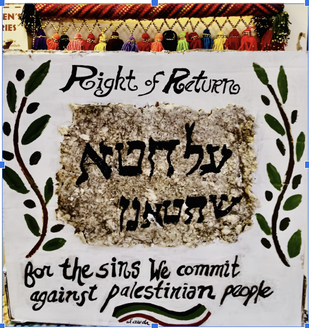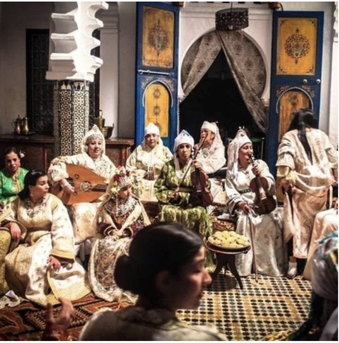|
Palestine Solidarity: A Monthly Reflection & Shomeret Shalom Direct Action Now the world has been turned upside down amidst the grief and overwhelm. You can support humanitarian aid to Gaza by making a donation to the Middle East Children’s Alliance . I created the portable altar above for two High Holiday events with Chavurah for Free Palestine in Oakland: A ‘Cast Out the Sins of Zionism Tashlikh’ and a Yom Kippur vidui for the sins of Israeli Apartheid. At Tashlich, in solidarity with Palestinians who are denied access to the sea and subject to massive water theft by the Israeli State, we tore up Israeli bonds in front of the Israeli bond office and put the torn up shreds into a pot with water and Palestinian sage given to me by Daoud Nasser of the Tent of Meeting near Bethlehem. I created a portable paper mache teshuvah altar for the ongoing sins against Palestinian. Your community can sign the Apartheid Free Pledge here: https://afsc.org/apartheid-free-communities. Storyteller Legacies: Celebrating Cultural and Spiritual Continuities
Thank you for supporting my work to train new generations of storytellers, ritual artists and cultural workers committed to liberatory practice. Here is a storytelling thread that ties the generation of Miriam the prophet to contemporary Jewish womyn’s style of celebration of the New Moon and other ceremonial events. New Moon In the biblical period, musician storytellers, ritual workers and keepers of the Mishkan welcomed the new moon by setting up a new moon altar, feasting and singing songs to the moon. Patriarchal expressions of Rosh Hodesh happen in synagogue are a pale shadow of what once was. Adding more words, ie the ‘yaaleh veyavo’ prayer in the Amida prayer erases this once vibrant expression of the centrality of the new moon in Jewish life. On the other hand, womyn’s communities across the Jewish world have observed the new moon by ceasing work (as they do on Shabbat), feasting, singing, making ritual and telling stories throughout the millenium! Perhaps this is the reason religious Jewish men observe Rosh Hodesh as a fast day since their wives do not cook for male members of their families on RH. In the early 1970’s Rosh Hodesh spaces became an important site for feminist cultural workers to transform Jewish life. In my work as a young rabbi, I deployed RH as a way to open the door to innovation, storytelling, and reclaiming centrality for Jewish women’s diverse histories in hundreds of Jewish communities. The picture which shows N African Jewish women celebrating RH Tevet is a retweeted image from Zecharia Shar’abi (Yemenite tradition). The occasion is Eid al-Banat Festival of daughters, celebrated by Jewish womyn from North African communities. Ashkenazi communities call this RH: Day of Judith. Both occur during Hanooka. Wishing you peace in the language of your heart, Rabbi Lynn
0 Comments
|

